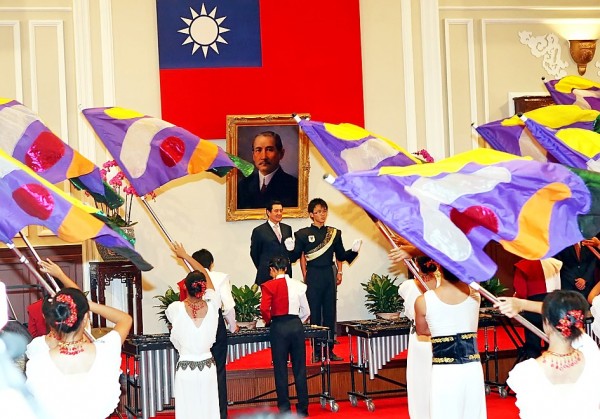《TAIPEI TIMES 焦點》 Presidential Office auditorium naming plan draws criticism

President Ma Ying-jeou, center left, attends a performance in the auditorium of the Presidential Office on July 23, 2008. Photo: CNA
By Stacy Hsu / Staff reporter
The Presidential Office yesterday announced plans to name an auditorium after former president Chiang Ching-kuo (蔣經國) to honor his dedication to young people, prompting criticism from lawmakers and political commentators.
“Seven years ago, the government and the private sector held a series of memorial events to celebrate the centenary of Chiang’s birth in 1910 and to commemorate his contributions to Taiwan,” Presidential Office spokesman Charles Chen (陳以信) said in a news release.
Chen said the preparatory process for the designation next week of the auditorium as “Ching-kuo Hall” began as early as last year.
Given that Chiang attached great importance to the cultivation of young people throughout his life and served as director of the China Youth Anti-Communist National Salvation Corps for nearly 21 years, the office is to hold the naming ceremony on Youth Day on Tuesday next week, Chen said.
The term “anti-communist” was removed in 2000 from the Chinese-language name of the corps , which was established by Chiang on Oct. 31, 1952, on the recommendation of his father, Chiang Kai-shek (蔣介石), to offer military training to high-school and university students.
“The primary purpose of the designation is to allow the public to learn more about Chiang Ching-kuo’s dedication to the nation,” Chen said.
Chen made the announcement hours after news about the plan broke in the media, drawing criticism from the New Power Party (NPP).
“Whether Chiang Kai-shek and Chiang Ching-kuo deserve to be worshiped remains debatable. It is inappropriate for President Ma Ying-jeou (馬英九) to project his own personal feelings onto others and use public buildings as a platform to deify [Chiang Ching-kuo] when [Ma’s] presidential term is set to expire on May 20,” NPP Legislator Freddy Lim (林昶佐) said.
Lim said that at a time when people are endeavoring to eradicate political totems and myths, those seeking to do the opposite are apparently living “far away from a free, open and democratic society.”
NPP Legislator Hsu Yung-ming (徐永明) said that former president Chen Shui-bian (陳水扁) in 2006 took the first step toward transitional justice by replacing the marble placard inscribed with the characters “Chiehshou Hall” hanging over the entrance to the Presidential Office Building with a new sign that reads: “Presidential Office.”
The term “Chiehshou” is seen as an authoritarian-era relic because it means “Long live Chiang Kai-shek.”
“Ma’s plan to set up Ching-kuo hall comes amid heated public discussion over transitional justice, and is apparently politically motivated and aimed at aggravating social divisions,” Hsu said, adding that the plan constitutes a setback to the nation’s push for transitional justice.
“When Chen took down the marble placard, then-KMT caucus whip Pan Wei-kang (潘維剛) accused him of disrespecting history, drawing a parallel between the move and China’s Cultural Revolution, and asked Chen not to squander government resources on matters of ideology,” political commentator Chung Nien-huang (鍾年晃) wrote on Facebook yesterday. “I wonder how Pan feels about Ma’s plan?”
新聞來源:TAIPEI TIMES




















